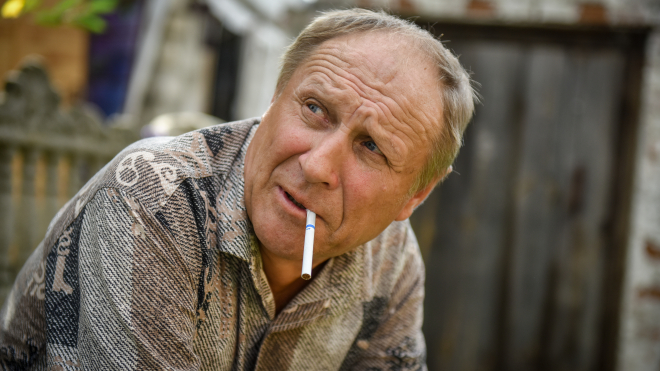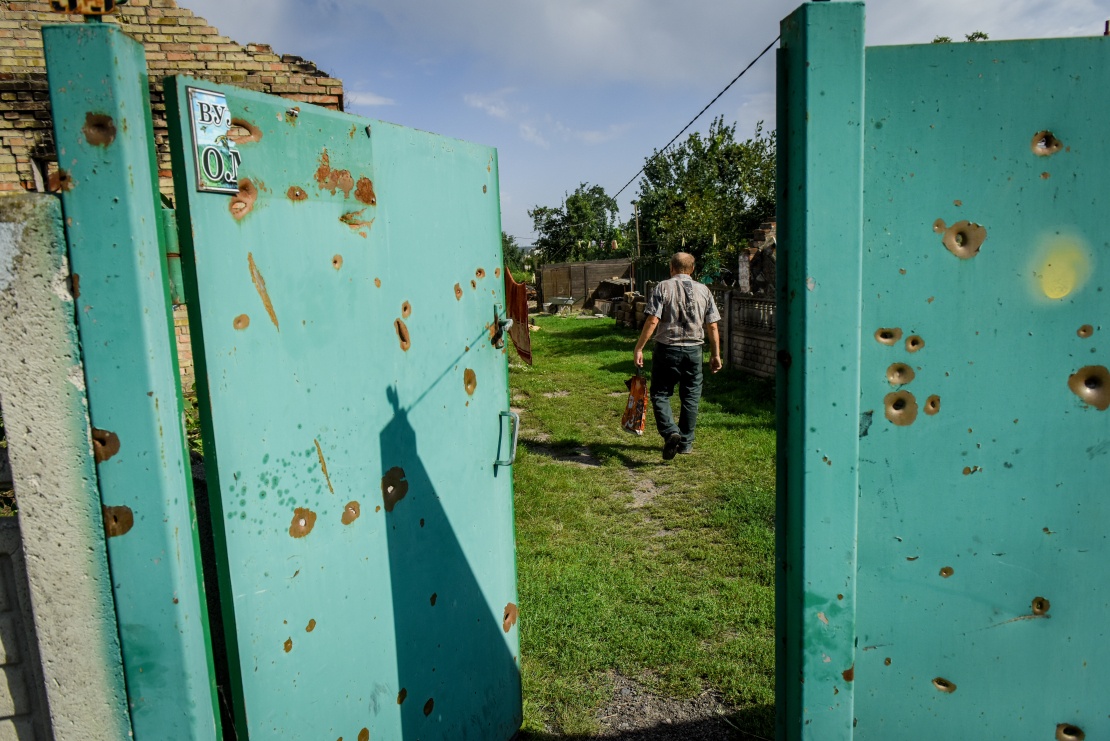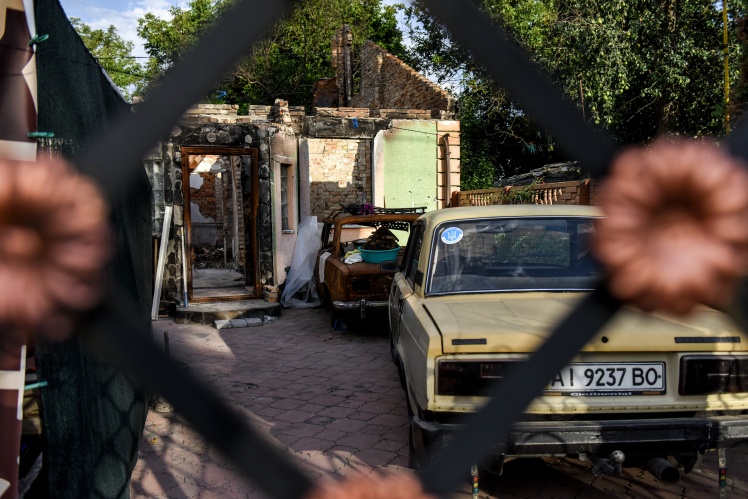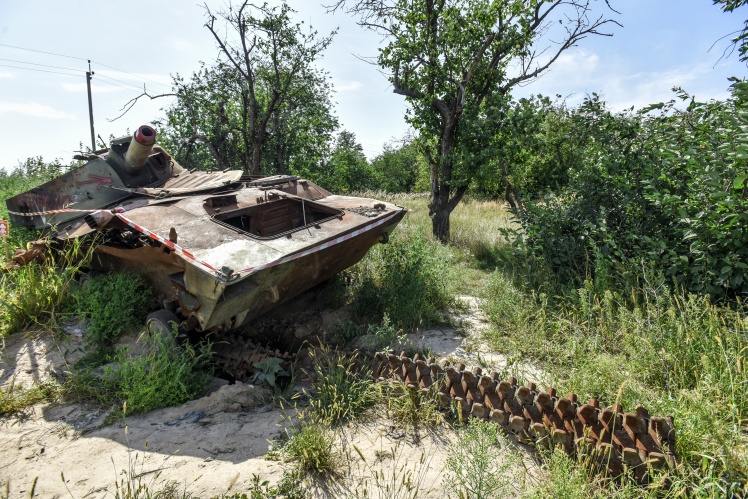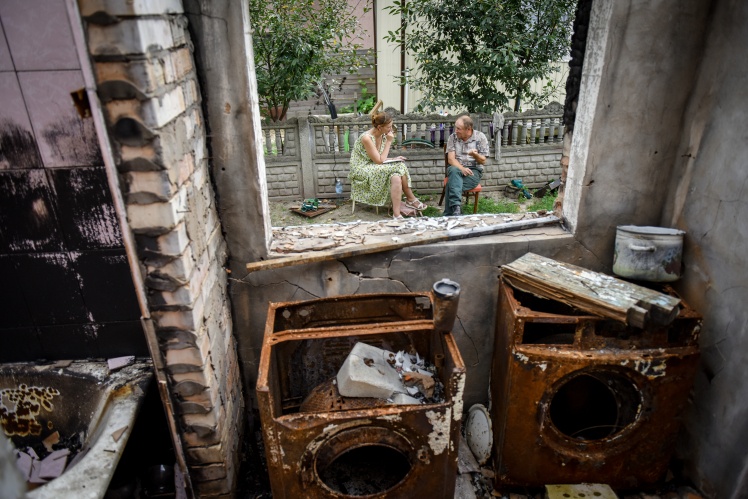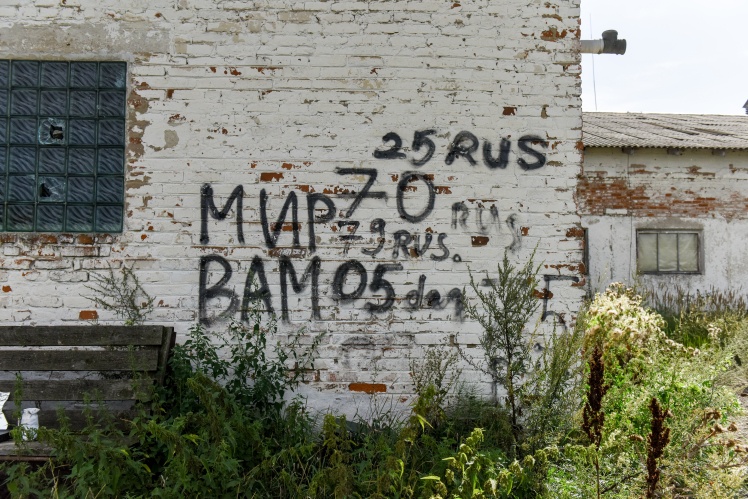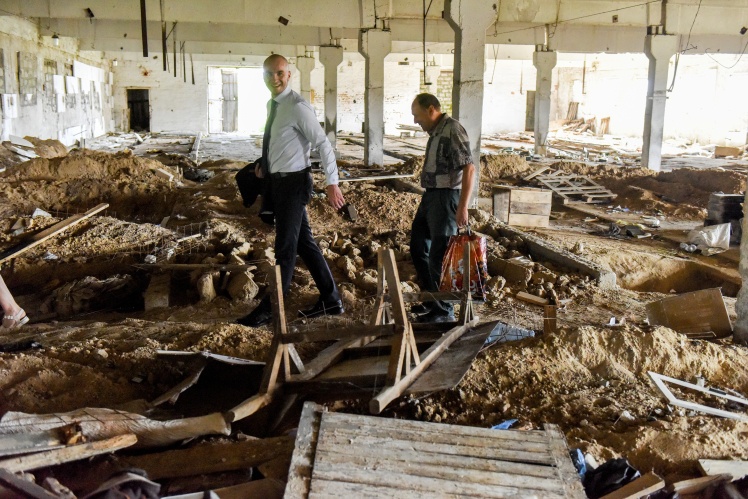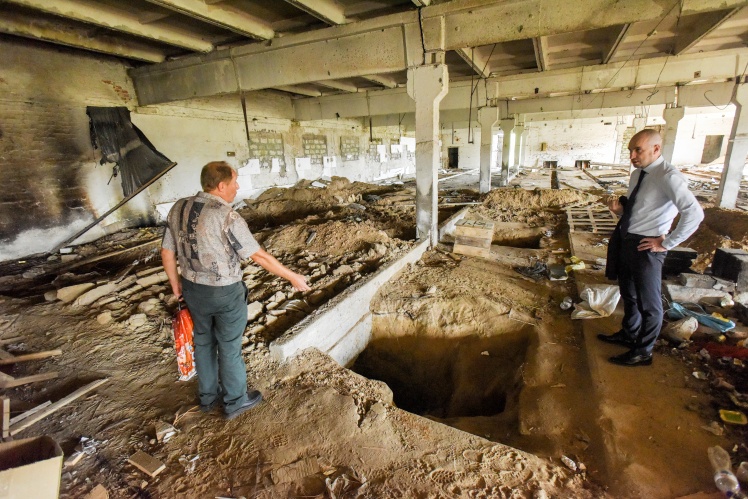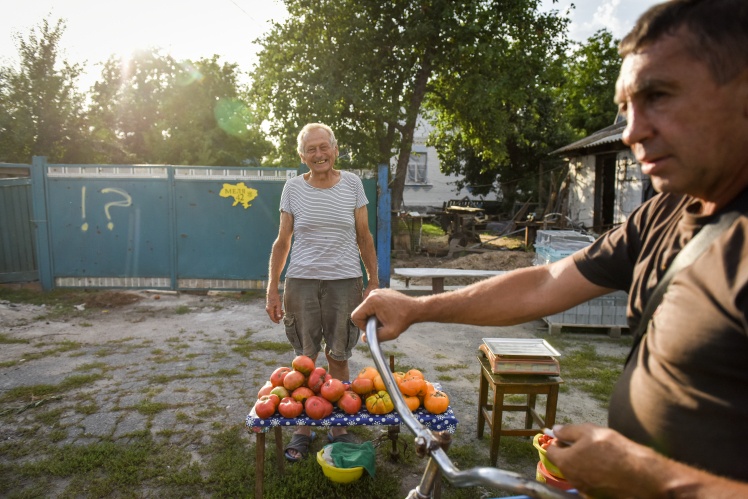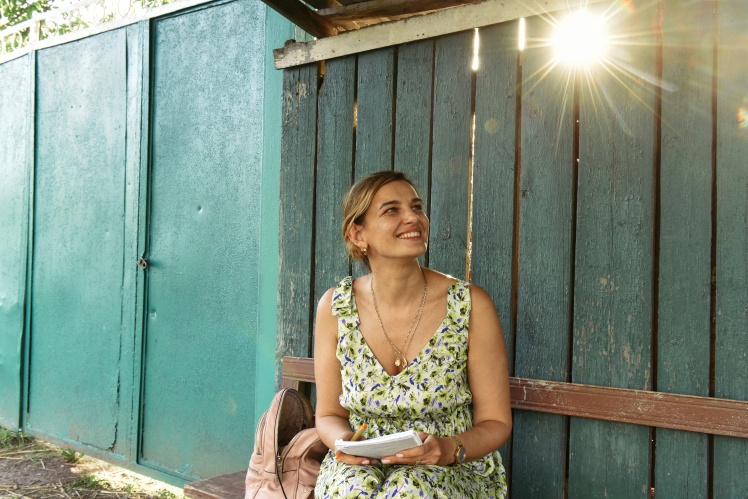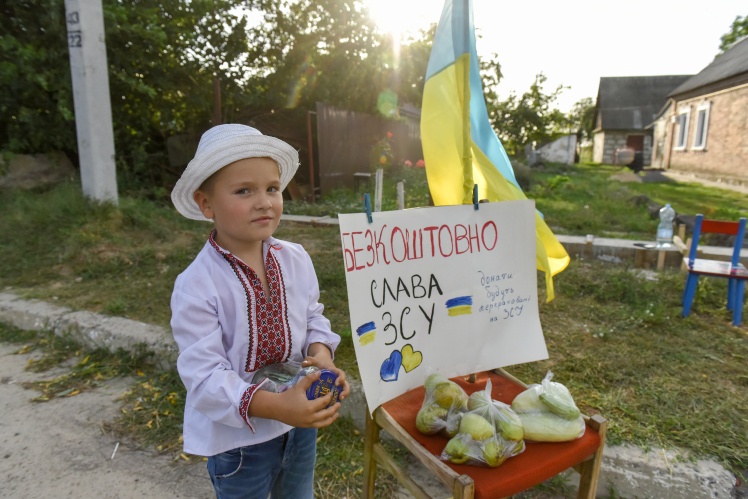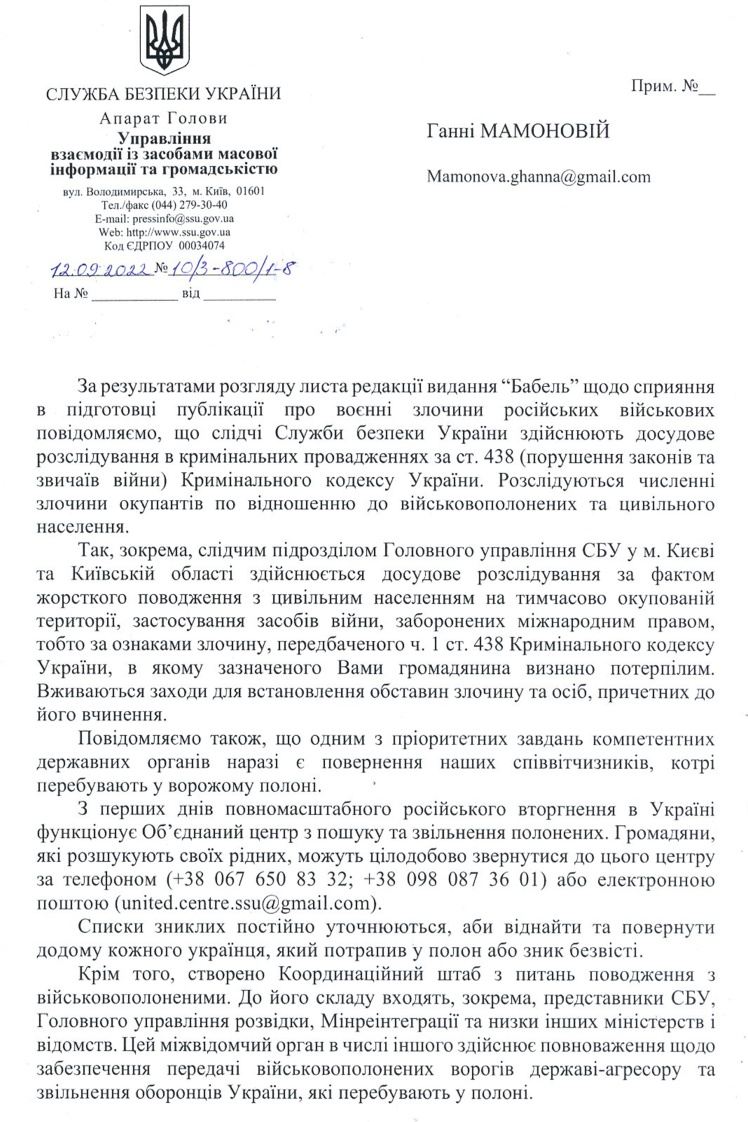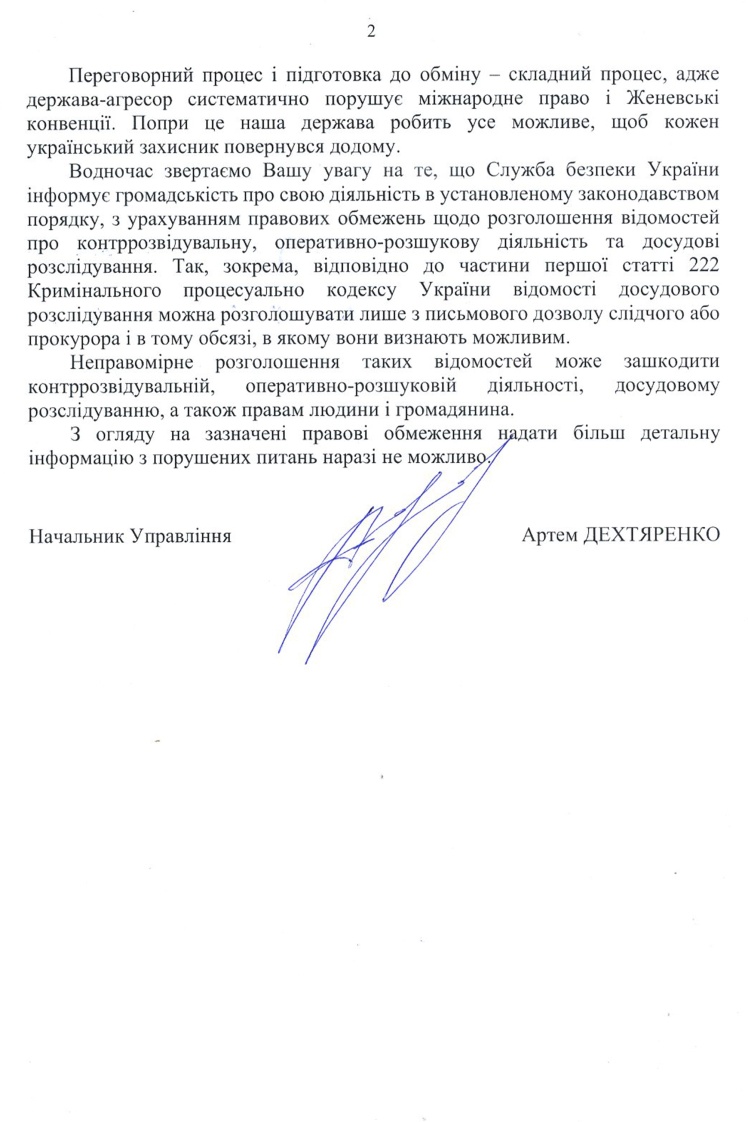1.
Mykola Savchuk is 53 years old, but after his capture he calls himself "grandfather". Heʼs stocky and mostly silent. In conversation, he often looks away, as if immersed in memories.
"Iʼve always been like that," he assures. “Hardy, calm, silent. Why be nervous?”
He worked as a driver for more than 30 years, driving officials and district bosses. And lately he has been driving trucks. On February 24 at six in the morning he also had to get behind the wheel.
“I got up at five in the morning, shaved, had breakfast. Got a call from work: ʼKharkiv and Kyiv are being bombed. This is war. Nobody is going anywhere, the roads are blockedʼ," recalls Savchuk. “I turned on the news — they said that the Russians came from the Belarusian side. The opinion is that they will go to Kyiv via Chornobyl. And apparently, like the Germans in the 1941, the Russians will move through Borodyanka, and they should stay away from Andriivka, there is nothing for them to shoot at the village. Thatʼs what I thought then. So I stayed at home. There was no thought of evacuation.”
Oleg Petrasyuk / «Babel»
Savchuk was liberated five months ago — on April 14. During this time, he told hundreds of people what it was like in captivity: to fellow villagers, to law enforcement officers, to doctors, to human rights defenders.
The last time he told his story was at the Makariv employment center, where we met. He came there to apply for unemployment benefits, because he cannot work after what he experienced: his hands donʼt obey him.
"Most problems I have with my left [hand], from which blood was taken," Mykola tried to clench his fist, but couldnʼt. “Now I can lift only something light. At home, I trained my hands by picking up water bottles, because before that I couldnʼt even hold a spoon. While in Kursk, other men fed me.”
In the Makariv Central District Hospital, the neurologist told Savchuk that the functioning of the hands can be restored, so there is no question of disability.
“Massages, injections, powders are needed, but all this takes money. And where to get them, if there is nothing left? No house, no car,” he says.
The Russian military captured Savchuk on March 1, and on April 14 in the Zaporizhzhia region, he was exchanged for captured Russians in a group of twenty Ukrainians. After that, he spent three weeks in the hospital in Novi Sanzhary and arrived in Andriivka in mid-May. He returned to the ashes: both his house and his wifeʼs house were hit by rockets. There was nothing left. Even the fence was destroyed by a Russian armored personnel carrier.
Oleg Petrasyuk / «Babel»
2.
Columns of Russian military equipment went through Andriivka on February 27. They were moving towards the town of Makariv, which is 20 minutes away by straight road. Occupiersʼ equipment moved without hindrance. Settlements were captured one after another.
In Andriivka, there were 13 men in the territorial defense, led by the headman Anatoliy Kybukevych. They had no weapons to stop or attack the Russian military equipment. Columns of Russians rapidly drove through the village, and the units that remained to control the settlement set up a base in cowsheds on the outskirts. From there one can reach Savchukʼs house with a hand. But at the time of the occupation, Mykola lived with his wife on another street, and he went home to feed the dog Tuzik.
Oleg Petrasyuk / «Babel»
How Andriivka lived under occupation
Andriivka was under occupation from February 27 to March 31. According to village headman Anatoliy Kybukevych, 17 civilians died during the occupation: 12 people were shot by the Russian military, five were killed during shelling, the intensity of which did not subside during the 33 days of occupation. In the village, 75 houses were completely destroyed, 300 were partially damaged: windows, roofs, and walls need to be repaired.
Four villagers were captured. Savchuk and the 21-year-old managed to be released in the spring during exchanges. His stepfather, together with another resident of Andriivka, are being held hostage in the pre-trial detention center in Kursk. Oleksandr Zaichenko is considered missing in Andriivka. It isnʼt known what happened to him.
The Territorial Defense of the village consisted of 13 men and was headed by a village head. Weapons in TrD consisted of carbines and rifles — everything that people had at home before the full-scale invasion. Also, on one of the days, they managed to disarm an infantry fighting vehicle. And on March 2, apparently on a tip-off from one of the villagers, the Russian military came to the house of the headman, but he, along with other members of the TrD, hid in the forest from the first day of the occupation.
The Territorial Defense team tracked Russian equipment and the actions of the occupying forces and passed on information to the Ukrainian Armed Forces, as well as helped people leave the village — guiding them on which way to go in order to avoid shelling or a collision with the Russian military.
On March 1, he took the dogʼs lunch and went home. He dressed as usual: a black jacket and a knitted hat, with winter galoshes on his feet. He thought about feeding the dog and untying him just in case. Had to do it in 15 minutes, so he left the phone at home.
“They cut me off on the way back,” he recalls. “I was just a hundred meters from home.”
“Hands up,” he heard from behind.
He turned around — two "Buryats". One pointed a machine gun, the other ran up, pulled the cap over Mykolaʼs eyes, twisted his arms and dragged him somewhere. Very quickly, Savchuk heard the click of the lock. The door opened and he was pushed down. He fell to the floor. The door closed. Mykola stood up, removed the cap from his eyes, saw glass jars of preserves in front of him, realized that he was in a cellar, and saw a man in the darkness.
“Sanya, you?” Savchuk asked.
Yes, it was his fellow villager who, like Savchuk, was caught on the street.
About two hours later, the occupiers opened the door and ordered men to get up.
“Sasha was the first to go, I was the second,” says Mykola. “I only showed the head from the basement, as a rifle stock hit my eyebrow. I bent over and felt blood. They pulled a cap over my eyes so I couldnʼt see anything, pushed me into a UAZ truck, tied my hands behind my back and took me to the forest.”
Half an hour later, the military vehicle stopped at the Russian camp, which, according to preliminary information, could be located in one of the golf clubs near Andriivka.
Oleg Petrasyuk / «Babel»
The prisoners were led to a group of people who were sitting on the ground with their hands tied behind their backs.
“There were seven people with us. There were guys from Khmelnytskyi and Zhytomyr regions. As if they came here for construction and were caught. All civilians, there were no military personnel. I asked,” says Savchuk.
The men spent the night on the wet ground with their hands tied behind their backs. At dawn, they were given a sip of water each, their eyes were taped shut and taken somewhere.
“We were driven through the forests for about a week and a half. They put us on an armored personnel carrier, and drove somewhere,” Mykola says. “We didnʼt see anything. Didnʼt ask where we were being taken, because they [the Russians] beat us for asking questions. Nothing was explained to us, we were not interrogated, sometimes they said that we were gunners. I told myself that I donʼt even have a phone with me, how can I be a gunner? They poked their toes at us in response, and that was the whole conversation.”
The prisoners werenʼt fed, only once the occupiers threw one galette cookie to each. Water — a couple of sips a day. Every night the men lay on the frozen ground in the middle of the forest. Their hands were constantly tied behind their backs, so almost immediately they began to hurt excruciatingly. The Russians tied them so tightly that a person couldnʼt move. To repel even the slightest attempt to escape, Savchuk and others were forced to take off their shoes at night — you canʼt run for a long time with frostbitten feet.
“The boysʼ fingers immediately began to freeze. Once one of us resisted taking off his shoes, the Russian said: ʼIʼll shoot you in the legs, and you wonʼt run away for sureʼ," Mykola recalls. “I was saved by the fact that I left the house in warm socks. Others sat almost barefoot. Among us was a young guy — Mykyta. He was captured in Andriivka together with his stepfather Oleksandr. They poured water on Mykytaʼs feet to freeze them even more.
Oleg Petrasyuk / «Babel»
3.
“When you are continuously beaten and transported from place to place blindfolded, you lose track of time,” says Savchuk. As he calculated, the Russian military took his blood on the ninth or tenth day of captivity.
Blood was pumped out in an abandoned building in the Kyiv region. Savchuk has never seen it, but after everything he experienced there, he says he will recognize it.
“We didnʼt know where we were being taken, but by feeling, we were constantly moving in the direction of Belarus. When we were driven to that building, I could see a sign near the road — Myrnyi was written on a white background. My eyes werenʼt tightly closed that time, I tilted my head and looked. There were many Russians and our Ukrainians in and around the building. They chatted in Ukrainian, but they were together with these [Russians]. We were removed from the armored personnel carrier, untied. They kicked me on the head, on the ribs. Then one [occupier] came. He said: ʼWe will shoot you.ʼ They took me by the arms and drag me.”
Savchuk was led to two men. One was in civilian clothes, spoke Ukrainian and flicked a lighter. The second was military. He was holding a can of gasoline.
“He poked my head and looked to see if I was nervous or not. “Tell,” he said. “What can I tell? Iʼm a civilian,” I answer. “Iʼll shoot you anyway,” says the Russian. “Shoot,” I say, "come on.” I look at his hands — his knuckles are covered with colored tattoos. Suddenly behind me I hear: bang, bang. A military man with tattoos looks and says: "They killed yours. Grandpa, youʼre lucky, itʼs not your turn now.” And left.
Savchuk, together with other prisoners, was placed on the floor of the building with their hands tied. This meant that they would be given peace for the next three to four hours. And so it was, until the battle began. Someone shot in the direction of the building.
“Ours are coming,” Mykola recalls his thought. “Now they will come and liberate us. And we are sitting on the floor, the Russians have buried themselves. They donʼt shoot back. I hear ours chattering among themselves, right next to each other, spinning somewhere and not reaching the building. And the Russians are sitting quietly, they pointed a machine gun at us and show “be quiet” — a finger pressed to the mouth. I thought that if I shout now, it will be the end for both me and the boys. Then our [military] say: “Thereʼs no one here” and leave. A little more time passed, and the Russians tell me: “Grandfather, you are lucky again, because we would shoot you all right here if yours had moved in.” And they took me for taking my blood.
Savchuk was put on a concrete slab in front of the building. The Russians didnʼt force him to undress in the cold. They raised the sleeve of the jacket on his left arm, applied a fabric medical tourniquet, and punctured the vein.
Oleg Petrasyuk / «Babel»
“The blood was drawn by the military with colored tattoos on the knuckles. He just punctured the vein and that was it. He didnʼt even ask, maybe I was sick with something. I asked him: “Why are you taking blood?” And he: “If you donʼt shut up, Iʼll shoot you now,” Mykola recalls. “Among the prisoners they took the blood only from me. I think thatʼs because I was the oldest among the imprisoned. Maybe the Russians wanted to take a lot, thinking that I would just die. They took it for a long time. A military man with tattoos managed to bring me water. I drank, but he did not stop taking the blood. But then their colonel arrived. A doctor. He was in military uniform, but I understood that he was a doctor. He approached us and said to the one with tattoos:
“We need blood.”
“We have it”, he answered and pointed at me.
“Why is he so pale?”, the colonel asked.
“We have many more of them. Enough,” said the one with tattoos.
The colonel pulled the needle out of my vein and said: “Heʼs losing consciousness. Take him inside.” Everything was floating before my eyes at that time,” continues Mykola, “I remember how they dragged me into the room, gave me wine, and then I switched off.”
Oleg Petrasyuk / «Babel»
When Savchuk was carried into the building, the galosh flew off his right leg. And while he was sleeping after the loss of blood and general exhaustion, he froze his toes.
“I woke up from some sounds next to me. My hands werenʼt tied, so I stood up. The room was full of corpses. The one with colored tattoos was lying dead next to me,” says Savchuk. “I donʼt know what happened to them. Maybe they were shot by theirs, maybe ours fired upon them. There were many corpses laying in piles. When I got up, the soldiers saw me. They thought I was dead. And then they shout: “One is alive here!”
Mykola looked around and noticed that there was no galosh on his leg, and began to look for it.
“One prisoner, Sashko with the mustache, Mykytaʼs stepfather, helped me. He said: “Kolya, look, hereʼs a galosh. Put on your shoes faster,” says Savchuk. “And I canʼt, itʼs not my galosh, it fell from someone else. We are not the first prisoners there... And Sasha said: “Put on your shoes, or they will shoot you.” I put on the shoe. They put us on an armored personnel carrier, took us to a helicopter and sent to Belarus. Mykyta, who had water poured on his leg, was taken to a helicopter because he could no longer walk.”
4.
There is little information about Russian bases in Belarus, where Ukrainians are kept. In informal conversations with Babel, investigators say that people who manage to get out of there canʼt describe the place of detention in detail.
According to Savchuk, they were brought somewhere in the forest where there were many military tents. Each tent had a small hut and places to sleep, like beds. The territory and each tent were guarded by soldiers with sheep dogs.
Oleg Petrasyuk / «Babel»
“It was forbidden to go out. We went to the toilet or somewhere else under escort: a military man with a dog led the group. When you leave the tent, you are immediately told: “Lower your fuckface” and they beat you in the stomach so you bend even more,” says Savchuk. “I only saw what was under my feet. We were given a box of firewood for the day, so we warmed up. They fed us three times a day — gave porridge, tea and water.”
There were twenty to twenty-five men in the tent. All had wounds: badly beaten, with frostbitten feet and broken toes and fingers. Savchukʼs toes on his right foot were frostbitten, and an unhealed wound appeared on his right shin from constant beatings. He could not feel his hands and could not do anything with them. There was a large bruise on his back: he was hit by something during one of the shellings in the Kyiv region. Under those conditions, he did not pay attention in the cold, but in the heat, a dull pain appeared. His face was a solid blue wound. Instead of eyes, there were purple swellings from beatings.
“A doctor came to see us, gave me some drugs. Once they took me to the doctors. They were in military uniform, spoke in Russian,” says Mykola, “they said that I must have had a heart attack, thatʼs why my hands donʼt function. There, I was taken to the prosecutor for questioning. He asked why I was detained. I said I donʼt know. He asked when I served in the army. I answered that in 1987-1989, during the Soviet times. I wrote down where I work, what kind of family I have. I didnʼt ask anything in return, because I was beaten for that. At the end, the prosecutor said that since I am already in Belarus, nothing else will happen to me.”
Oleg Petrasyuk / «Babel»
5.
Savchuk stayed in Russiansʼ Belarusian camp for about a week. Then, at night, the military came to the tent and ordered everyone to get into a van. Five hours later, the car pulled into a yard. The door opened, and an unknown man shouted: "The Red Banner of the Order of Lenin Kursk Central Prison welcomes you!" The captives began to leave the prison car.
Savchuk was held in Kursk in cell No. 5/6 together with nine Ukrainians. They were civilians from the Kyiv region and military personnel from Glukhiv, Sumy, and Ivano-Frankivsk. In the same prison there were women captured in Ukraine. Savchuk saw them.
Prisoners had to get up at 6 AM. They quickly went out into the corridor, raised their hands up, spread their legs wide and sing the national anthem of Russia, Katyusha, Uncle Vova, we are with you.
“The guard stands in front of you and says: “Grandfather, sing the hymn.” I start, then the guard tells another prisoner to sing, and if he doesnʼt know the words or makes a mistake, he beats him,” Savchuk describes the morning singing. “Once we were taken out for a walk, I was standing with a young guy. A security guard approaches and says: “We wonʼt cut off grandfatherʼs eggs, he is old. And youʼre young — weʼll cut your off.” He was joking like that, the boy wasnʼt touched, donʼt worry.”
Mykola was taken for interrogation once every three days. They asked the same thing in a circle: where he was born, where he lived, was he married, how many children did he have, for whom he works, when he served in the army. According to Savchuk, Ukrainian soldiers were beaten the hardest in Kursk during interrogations. The civilians were not particularly abused, says Mykola: during multiple interrogations he was beaten “only once”.
Oleg Petrasyuk / «Babel»
“One soldier had a through wound. He was wounded near Kyiv, stitched up in captivity, but the Kursk guards “unstitched him",” says Mykola. “The climate in the cells was very bad, everything was moldy. Wounds were rotting. My leg was rotten, someoneʼs hand too. On the first day, we were given toothpaste and soap along with clothes. On the first day, everyone brushed their teeth, washed, and then began to apply paste and soap to the wounds and dry them.”
According to Mykola, doctors visited the prisoners once a week. They checked their condition. Medicines and injections were given daily if needed. The bandage on his lower leg, where the wound didnʼt heal, was changed twice. But the doctors refused to heal his frostbitten fingers.
The Russians fed prisoners with balanda in the morning and in the evening. The portion came with three pieces of bread. Mykola ate one piece, gave two to the younger boys in the cell.
“We wanted to eat constantly, what we were given wasnʼt enough,” he says. “And we also wanted to sleep. Someone was screaming at night or couldnʼt sleep, and I was so exhausted that I slept all the time.”
6.
On the morning of April 13, the escort ordered Savchuk to pack. They gave him civilian clothes (before that he was wearing a prison uniform) and put him in a prison car. There were other prisoners there too. They were brought to the airfield and told to wait for orders. Nothing happened during the day, the prisoners were taken back to the prison and returned to the airfield the next day. The plane, in which Savchuk was with other prisoners, landed and took off twice. Someone was put in them, someone was taken out.
“We only heard something, our eyes were covered with tape, and if we raised our heads, we were immediately hit,” he says. “The third time we landed, it was dark outside, they took us out and brought us to the barracks. There was an anchor, beds and many Ukrainians. I ask: “People, where are we?” And one woman says: “Sevastopol. You will see the sea in the morning.” And indeed, at dawn, the sea flashed in the window. Then I realized that I was being exchanged.
Oleg Petrasyuk / «Babel»
In the morning, Savchuk was taken to the military for a conversation. They asked if Mykola did not want to take Russian citizenship. If yes, they will treat his hands and frostbitten leg and send him to fight on the front. Mykola said that he wanted to go back to his village.
Together with a 60-year-old woman from Mariupol and other prisoners, he was put in a van and taken to an exchange.
“We couldnʼt see where we were being taken, there were no windows. They drove for a long time, and they brought us to a bridge. We went towards Ukraine, and the Russians came towards us. Some of them were on stretchers. On our side, they put us on a bus, gave us a phone and took us to Novi Sanzhary, says Mykola.
In Poltava region, Savchuk, together with other prisoners released from captivity, spent three weeks in the Novi Sanzhary medical center of the National Guard of Ukraine. In the discharge from the hospital, it is indicated that he arrived with III degree frostbite of 1-4 toes of the right foot, a purulent-necrotic wound on the outer surface of the right leg, a closed chest injury, neuropathy of the left radial nerve with pronounced paresis of the left hand, neuropathy of the right median and ulnar nerves with pronounced paresis of the right hand, and neurodystrophic syndrome.
It is impossible to cure such injuries in three weeks. He was discharged, made a new passport and asked to be treated at the place of registration. The SSU employees recorded his story about the capture, the volunteers called Andriivkaʼs head, and he came to pick up Savchuk by car.
Oleg Petrasyuk / «Babel»
“Of course, I cried when I met everyone at home. I have five children. Lyuba, the eldest daughter, was more worried than anyone else, looking for me,” says Mykola.
This is the most difficult moment for Savchuk to remember out of everything that happened to him, so he quickly changes the subject.
“Mother of Mykyta, who had water poured on his feet, came. She said that he was released and is in a rehabilitation center now. And I said that her husband and another guy from Andriivka are in Kursk. I donʼt know why they donʼt exchange them. I was probably released before everyone else, because my leg was rotting,” says Mykola.
7.
Before the liberation of Kharkiv region, Ukrainian law enforcement officers recorded more than 32,000 war crimes, crimes against humanity and genocide committed by the Russian military after the full-scale invasion. More than 16,000 criminal proceedings have been opened against the Russian military and their accomplices.
In the case of war crimes against Mykola Savchuk, the red line is the crime of forced donation. Is he the only prisoner who testified that he was forced to donate blood? The SSU and Prosecutor Generalʼs Office refused to provide Babel with official information, citing the interests of the investigation. In informal conversations, the investigators confirm that in March and April they received information about taking blood from civilians in captivity in the occupied territories. At that time the blood banks of the Russians were emptied, and they were replenished at the expense of prisoners. The demand for IV blood group, the rarest, was especially high. Savchuk has II group (A+).
This photo was taken after returning from captivity.
«Babel'»
International humanitarian law and the Rome Statute governing the International Criminal Court prohibit forced blood donation. For example, the Additional Protocol to the Geneva Convention for the Protection of Victims of International Armed Conflicts states that medical procedures that could harm any person, be it a prisoner of war or a civilian, are prohibited.
“Forced donation is not regulated by international humanitarian law,” said Oleksandr Vlasenko, spokesman of the International Committee of the Red Cross, in a comment to Babel. “But torture is strictly prohibited. What happened to the person you mentioned [Savchuk] was torture.”
The Fourth Geneva Convention on the Protection of Civilians in Armed Conflict prohibits the capture and abduction of civilians. The capture of Savchuk and other civilian residents of the Kyiv region should not have happened at all, so everything that happened to them is a war crime.
The Security Service of Ukraine and the Kyiv Regional Prosecutorʼs Office officially informed Babel that Savchuk was recognized as a victim in the case of brutal treatment of the civilian population and the use of means of war prohibited by international humanitarian law. The pre-trial investigation is conducted under Art. 438 of the Criminal Code of Ukraine “Violation of laws and customs of war”.
«Babel'»
Lawyer Yuriy Bilous sent information about the crimes committed against Mykola Savchuk to the International Criminal Court in The Hague. Since March 4, 2022, Bilous has been collecting evidence of war crimes committed by the Russian military in Ukraine. He met Savchuk when he interviewed residents of Andriivka.
"In the end of this case, we should expect a court verdict,” says the lawyer in a comment to Babel. “I donʼt want to look like a romantic or a person with rose-colored glasses, but, in my opinion, the state of Ukraine should and can identify those who committed war crimes against Savchuk. In places of deployment of the Russian military, there are documents or garbage that can be used to identify a military unit, the names of army personnel. Savchuk says he can recognize the soldiers who detained and tortured him. Perhaps these people are already in our captivity. If we talk about crimes, then in Mykolaʼs case it is not only taking blood, but also illegal transfer, illegal detention, torture, destruction of property. Someone ordered him to take off his shoes, someone gave the order to take him to Belarus and Kursk, someone took him prisoner in the village. Okay, we canʼt gather evidence that he was forcibly bled, but we have enough evidence that he frostbitten his leg in captivity: there are medical records and witnesses.
«Babel'»
The Ukrainian law enforcement system must put an end to Savchukʼs case in court. If this does not happen, the case may be considered by the International Criminal Court in The Hague in the future, Bilous draws attention.
“The main principle of the ICC is the principle of complementarity,” he says. “This court cannot work by itself, without interaction with Ukraine. And it canʼt replace the national Ukrainian judicial system. The responsibility for investigating war crimes and bringing the perpetrators to justice lies primarily on us. For example, Savchukʼs health was damaged — it is not clear whether he will recover the functioning of his hands. His property was stolen and destroyed. To talk about material compensation, court verdicts in Ukrainian courts are required.
8.
Savchukʼs current health problems are related to the fact that he was captured on March 1. This is confirmed by medical certificates issued in Novi Sanzhary. As for the functioning of the hands, it is unlikely to restore their sensitivity to one hundred percent — as Ruslan Novikov, neurosurgeon of the Kyiv City Clinical Hospital No. 17, assistant professor of neurosurgery at the O. Bogomolets National Medical University, tells Babel.
“When a personʼs limbs are fixed in one position, for example tied back, and he is still beaten in this position, blood circulation and blood supply to nervous structures are disturbed. Considering the fact that the human body is not symmetrical, in one limb there was a little better blood circulation, in the other worse. That is why there are more problems with the left hand than with the right,” says the neurosurgeon. “The person must be rehabilitated. It recovers, but almost never 100 percent.”
The Ministry of Health of Ukraine does not have a specialized medical program for civilians who were released from captivity or who were tortured during the occupation, Oleksandra Mashkevych, Director General of the Directorate of Medical Services of the Ministry of Health, said in a comment to Babel.
Oleg Petrasyuk / «Babel»
“We do not distinguish whether a person was released from captivity, was tortured, or something else. Everyone has the right to guaranteed medical care. Nevertheless, we understand that those who, for example, returned from captivity, need more attention, and it should be comprehensive: social services, medical care, legal support,” says Mashkevych. “When Savchuk was released from captivity, he was hospitalized. Everyone who is released undergoes a medical examination. After hospitalization, the person had to be gently transferred to the family doctor, who would have to assess whether it was necessary to refer him to a specialist or for examination.”
Mashkevych reminds that the drug reimbursement program — the state provides them free of charge — covers diabetes, asthma, blood pressure problems, and cardiovascular diseases. Patients buy other medicines at their own expense. However, during urgent treatment, drugs and services are free of charge.
“Perhaps in the case of Savchuk, the doctors did not work well. They could send him to rehabilitation, which is also free of charge, or refer him to urgent treatment. But we must remember that Ukrainian doctors survived the occupation. We have a situation where a traumatized person seeks help from a traumatized person. And of course, they could not know something. We are currently training family doctors in psychological first aid practices within the framework of the National Mental Health Protection Program. We are introducing a psychological first aid package into the medical guarantee program. I think it will start working in the fall. For people who survived captivity, this is important.”
9.
Savchuk does not want to seek psychological help. When he hears about this opportunity, he smiles.
“What to say? Why complain if youʼve already caught it? They recruited us in order to exchange us for theirs, thatʼs why they grabbed everyone they could. Thatʼs how it happened. I would like to somehow get a new car in order to earn money, to heal my hands, and would be happy if the boys from Andriivka could return from Kursk,” answers Savchuk when asked if he wants something special now.
“Do you want to take revenge?” I ask.
“If those who beat me were brought to my yard, I would talk to them in my own way. First, I would give them water to drink, just like they gave me — two sips, and then...” Savchuk pauses. “I would give them a couple of kicks and let them go. What to take from them? They will kill themselves anyway. And I have to live.
Oleg Petrasyuk / «Babel»
Translated from Ukrainian by Anton Semyzhenko.
We are documenting the crimes of this war and will work as long as it takes. You can help us — support Babel: via Patreon 🔸 [email protected]🔸donate in cryptocurrency🔸in Ukrainian hryvnia.
